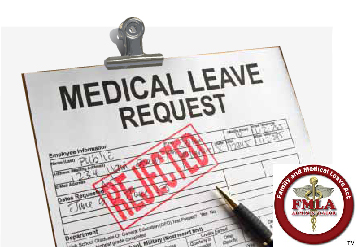The Sixth Circuit Court of Appeals in Wallace v. FedEx Corp upholds a jury award for the plaintiff and weighs in on the notice requirements of both employees and employers under the FMLA.
Life is messy.That is an undeniable truth.
Despite best laid plans, taking precautions, and “playing it safe,” there will always be some event that acts as a stick stuck in the spokes of the proverbial wheel of life. For employees and employers alike, one of the most frequent and disruptive “sticks” is employee illness. For the majority of Americans, getting sick—especially a lengthy or severe illness—can have the devastating effect of causing one to lose one’s job. For employers, a lengthy illness by an employee can mean loss of productivity, loss of continuity, and other disruptions that make it difficult to run a business. The Family and Medical Leave Act (“FMLA”) attempts to strike a balance between these competing interests of employers and employees: provide FMLA-qualified employees with flexibility when faced with a life event covered by the statute without fear of losing their jobs, while also providing employers with the necessary information to make the necessary adjustments to the workplace.
In theory and in writing, this balance sounds all well and good. In reality, the FMLA is often a can of worms for employers to comply with and for employees to understand. One of the most-often litigated issues related to FMLA leave is the statute’s notice requirements. First, whether the employee has provided sufficient notice to the employer that FMLA leave is needed (and that the employee is entitled to it).[1] And second, whether the employer has upheld its notice requirements to employees.
The recently-decided case of Wallace v. Fedex Corp.[2] from the Sixth Circuit Court of Appeals deals with the rocky intersection between the statute’s employee and employer notice requirements. This case specifically focused on the notice and health certification requirements as set out in the FMLA’s regulations, 29 C.F.R. § 825.305.
For the purposes of this blog post, the bare-bones facts of this case are as follows: Ms. Wallace worked Fedex for approximately twenty-one years, ultimately reaching the position of senior paralegal in the summer of 2007. In addition to being, by all accounts, a dedicated employee, Ms. Wallace also suffered from a history and variety of health problems. Throughout the summer of 2007, and despite numerous explicit warnings from her supervisor, Ms. Wallace found it increasingly difficult to arrive by her appointed 9:00am start time due to her health problems. By August 2007, Ms. Wallace found herself needing extended time off from work. After visiting her doctor and obtaining letters from that doctor explaining the need for Ms. Wallace to take several weeks off of work, Ms. Wallace met with her supervisor and attorneys from FedEx’s Labor and Employment Group. During this meeting, Ms. Wallace’s supervisor presented Ms. Wallace with FMLA forms, including a request for medical certification. The jury ultimately found that at no time during this meeting did Ms. Wallace’s supervisor or the FedEx attorney inform Ms. Wallace of the importance of this certification form: namely, if she did not get it filled out by her doctor and return it to FedEx within 15 days, FedEx could deny her FMLA request. Ms. Wallace, as the jury concluded, not knowing of the extreme importance of this documentation failed to submit it to FedEx even though she had her doctor complete the forms. After days of Ms. Wallace being out of work and not contacting her supervisor, FedEx made the decision to terminate her for failure to comply with FedEx’s attendance and leave policies.
The turning point for this case, as in many others, was the sufficiency of Ms. Wallace’s notice to FedEx of her intent to use FMLA leave. Why is notice so important? Well, that is because the statute and accompanying regulations clearly state that while an employee need not use “magic words,” such as “I need to take FMLA leave,” it is the employee’s duty to provide the employer with sufficient information from which the employer can determine that FMLA leave is needed.[3] An employer’s liability for FMLA violations only attaches if and when the employer knows that the employee is seeking FMLA qualified leave.
FedEx argued that it did not interfere with Ms. Wallace’s FMLA rights because Ms. Wallace never returned the health certification form as required, and so FedEx did not know the duration of the leave that she required. It argued that because Ms. Wallace failed to return the forms, it did not know that she intended to take FMLA leave. The Court remarked, “[s]pecifically, FedEx focuses upon Wallace’s failure to return the medical-certification form or to indicate that she desired leave beyond August 29 [2007].”[4] The Court rejected this argument and explained that, “[b]y focusing on whether Wallace provided enough documentation for continued leave, FedEx largely misses the point of this notice element. The relevant question is whether Wallace provided FedEx with notice that she needed FMLA leave, not whether she provided notice that she needed a certain amount of FMLA leave.”[5]
To support its claim, FedEx cited the FMLA regulation that gives employers the option to request its employees provide a medical certification.[6] The health certifications of the type FedEx relied upon (samples of which can be found on the U.S. Department of Labor website here) provide employers with vital information regarding the reason for the leave, the type of leave (intermittent or for a block of time), and when (if known) the leave is supposed to end. If the employee fails to return the completed certification to the employer within 15 days, the employer may delay or completely deny the employee’s FMLA request.[7] An employer must give notice of a requirement for certification each time that it desires one, and such notice must be in writing.[8] Because of the incredibly detrimental effect of failing to complete and return the FMLA form within the required time period, the regulations require that “[a]t the time the employer requests certification, the employer must also advise an employee of the anticipated consequences of an employee’s failure to provide adequate certification.”[9] It was this advice that the jury found that FedEx had failed to give Ms. Wallace, and which rendered it liable for interfering with her FMLA rights. The Court noted, “[t]here was no mention of the need for medical certification or the consequences of failing to produce it. Given this evidence, a reasonably jury could find that FedEx failed to comply with the FMLA regulations and, thus, that terminating Wallace’s employment interfered with her ongoing FMLA leave.”[10]
What is the importance of this opinion? Several things:
- It reinforces the notice standard and the obligations that proper employee notice puts on employers. This opinion reinforced that in order to trigger FMLA protection, the employee need only provide notice of the need for leave, and that the employee need not initially indicate the exact duration of the leave in order to trigger the FMLA’s protections. Indeed, the regulations require the employee to provide the “anticipated duration of the absence,” not the exact length. 29 C.F.R. § 825.303(b). The facts of this case demonstrated that prior to the debacle about the certification forms, Ms. Wallace had already provided the employer with information sufficient to trigger her FMLA rights. In her case, that meant providing FedEx with enough information from which it could conclude that she suffered from a serious health condition that entitled her to ongoing leave. Thus, her failure to provide the certification did not justify her termination and the interference with her FMLA rights that her termination caused. This means that employers cannot terminate an employee who is justifiably on FMLA leave just because the employee fails to hand in the forms.[11]
- Just because the employee need not tell the employer of the duration of the leave at the beginning, the employer is entitled to inquire about it and know the intended duration. Just because FMLA provides qualified employees up to 12 weeks of unpaid leave does not mean that every condition justifies the entire 12 weeks. As a matter of practice, employees should always keep their employers informed of intended return-to-work dates, need for reevaluations, and the scheduling of any other doctor’s appointments related to the reason for taking the leave.
Ultimately, this court opinion does not shift the burden more or less to either the employee or the employer. Instead, it reiterates the importance that both employees and employers know their obligations under the law. If you are either employer or employee and you have questions about FMLA rights, before you act and whenever in doubt, contact an attorney who is well versed in the FMLA.
* * *
Meredith Schramm-Strosser is the co-author of the MSBA Maryland Employment Law Handbook’s chapter on the FMLA, titled, The Family and Medical Leave Act: A Practitioner’s Guide. Meredith also frequently represents clients regarding FMLA issues.
[1] 29 C.F.R. § 825.305.
[2] Wallace v. FedEx Corp., Nos. 11-5500, 11-5577 (6th Cir. Aug. 22, 2014).
[3] 29 C.F.R. §§ 825.302; Brohm v. JH Props., Inc., 149 F.3d 517, 523 (6th Cir.1998) (“[T]o invoke the protection of the FMLA, an employee must provide notice and a qualifying reason for requesting the leave.” (citing Manuel v. Westlake Polymers Corp., 66 F.3d 758, 762 (5th Cir.1995))).
[4] 2014 WL 4116484, at *11.
[5] 2014 WL 4116484, at *12.
[6] 29 C.F.R. § 825.305.
[7] 29 C.F.R. § 825.305. Intriguingly, even though the regulation appear to provide a maximum amount of time in which a certification may be returned where it states that an “employee must provide the requsted certirficaiton to the employer within 15 calendar days after the employer’s request,” § 825.305(b), the Sixth Circuit in Wallace found this to be a minimum, noting that “[t]he FMLA requires an employee to return a certification form in ‘a timely manner,’ and the Secretary [of Labor] has interpreted this phrase to allow employees at least fifteen days to comply with their employers’ requests.” 2014 WL 4116484, at *14.
[8] 29 C.F.R. § 825.305(a).
[9] 29 C.F.R. § 825.305(c).
[10] 2014 WL 4116484, at *13.
[11] E.g., Killian v. Yorozu Automotive Tenn., Inc., 454 F.3d 549, 555 (6th Cir. 2006) (“Finally, even if [the employee] failed to provide the [health] certification in a timely fashion, [the employer’s] remedy under the regulations was once again delayed [FMLA] leave, not termination.” (citing 29 C.F.R. § 825.311)).



